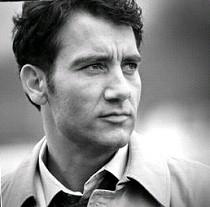 The badly-cropped image to your right is a picture of the Man Who Should Have Been Bond: Clive Owen.
The badly-cropped image to your right is a picture of the Man Who Should Have Been Bond: Clive Owen.Instead, the Friday 14 annoucnement, in London (a day after the far merrier Pinter Nobel) is bad news for those who want their Bond dark-haired, and good with a croupier.
Owen, by far the better actor, seemed a shoe-in - after all, he actually looks the part, and has played several Bond-like characters. Perhaps Owen did not want the part, now that he is an Oscar-nominated act-tor.
What we have instead is Dalton Mark Two. Warning bells are already ringing, and the volcano HQ is about to self-destruct, along with the franchise. As soon as I read that Craig wishes to "take the part to darker, more serious places, with more emotion" and that the writer of the screenplay wishes to create a sombre character study without Q or gadgets, I realized that the reality principle was about to burst the greatest fantasy bubble in cinema history. Bond is not Hamlet, nor was meant to be. When Dalton tried to go dark and thespian, it went all pear-shaped.
I hope I am wrong about this. However, rather than getting Masterpiece Theatre on Bond's ass, they should have hired Tarantino or some other edgy, cool director to make a retro classic, updated to reflect the current cinematic trends from Asia and beyond. Retreating to Casino Royale seems like a fallback position. I am shaken, not stirred, today, to reuse the most tired trope in the biz.
Comments